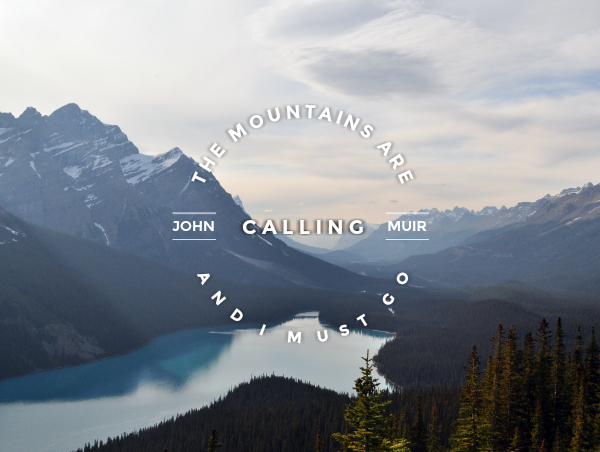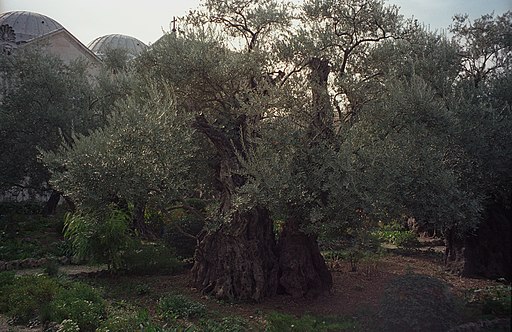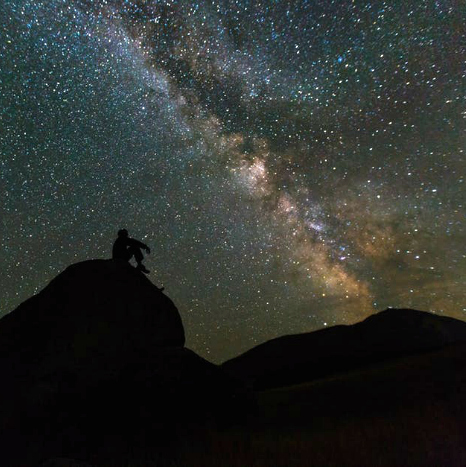Why People Are Drawn to the Outdoors
Plaid. Flannel. Beards. Beanies. Ponchos. Vibram-souled footwear. Anything “Patagonia.” National Parks. Hiking. Camping. Woodland decor. Lots of talk about “going green,” unplugging, living more eco-friendly. Imagery of mountains, meadows, rivers, lakes, and wildlife. I have no official data on the subject, but based on my Instagram feed, it would appear that nature and the outdoors are getting quite a bit of love these days.
Not to say that enthusiasm for the outdoors is anything new, but it seems that many more people are catching the bug. Why is this? What is it about being outside that has so many people declaring with John Muir, “The mountains are calling and I must go”?
 There are probably a lot of reasons.
There are probably a lot of reasons.
People are increasingly aware of the impact that humans have on the planet and its inhabitants. Parents worry about their children as they spend more and more time indoors in front of screens. As information about and images of the outdoors become more prolific on the internet, people naturally yearn to visit those places. As our world is progressively filled with the virtual, artificial, and synthetic, many crave the real, the natural, and the organic.
If we’re being honest, we probably have to admit that at least some of our society’s fixation on nature is less than authentic. We’ve all seen the guy sporting a man-bun and Timberland boots who has most certainly never stepped foot on anything that wasn’t concrete or a manicured lawn. However, I think there is something in each of us, much deeper than any partiality to certain fabrics or home decor, that “calls” us to the outdoors. It is a theme that replays itself over and over again throughout human history.
 Let’s go back to the beginning.
Let’s go back to the beginning.
Whether you take literally the story of Adam and Eve in the Garden of Eden, or believe that we evolved from “lesser” creatures over millions of years—nature is our first and strongest connection to our true, heavenly origins. Many of the great spiritual manifestations in scripture happened in the great outdoors.
Before there were temples dotting almost every continent of the earth, there was Moses’ burning bush and Mount Sinai, where he received the Law of Moses. The mountains where Nephi saw his father’s vision and learned how to construct a ship. The forests where Enos’ soul hungered and he prayed for a day and a night. The sacred grove where Joseph Smith saw God the Father and the Savior, and the hill where he returned each year to receive instruction from the angel Moroni.
 The Savior Himself often retreated to nature.
The Savior Himself often retreated to nature.
Before Christ began his ministry, he was “led of the Spirit into the wilderness to be with God” (JST, Matt. 4:1). Later, when he heard that his beloved cousin John the Baptist had been beheaded by Herod, Jesus again sought strength in solitude as he “departed thence by ship into a desert place apart” and “went up into a mountain to pray” (Matt. 14:13, 23).
—from Walk in the Wilderness, by Vallerie Holladay, July, 1998 Ensign.

Everyone can feel closer to God in the wilderness.
Greater evidence of this cannot be found than in the shared experience of those who spend time in nature. Who has gazed upon the multitudes of stars and not felt infinitely small, and yet connected to something infinitely great and meaningful? Despite a wide array of experiences, religions, values, and belief systems, I hear similar sentiments repeated by all who escape frequently to the outdoors. They speak of a peace of mind and soul to be found nowhere else—strength, perspective, purpose, and the quiet joy gained from the stillness and beauty of these sacred places. I am convinced that, whether they know it or not, everyone who experiences these things senses that “all things denote there is a God.”
 As man’s ways depart further and further from God’s ways, it is no wonder that people continue to seek peace “not as the world giveth.” Apart from temples, the only places left where that peace can be found are increasingly in the mountains and canyons, forests and deserts, plains and rivers.
As man’s ways depart further and further from God’s ways, it is no wonder that people continue to seek peace “not as the world giveth.” Apart from temples, the only places left where that peace can be found are increasingly in the mountains and canyons, forests and deserts, plains and rivers.
So the next time you hear the mountains calling to you, consider it an invitation to bring more peace into your life—and go.
Where in nature do you feel closest to God?


